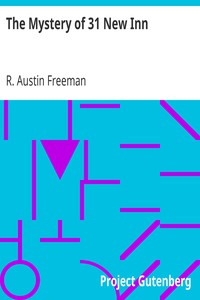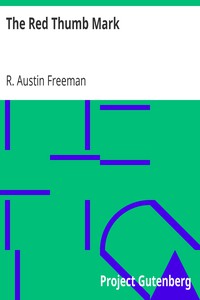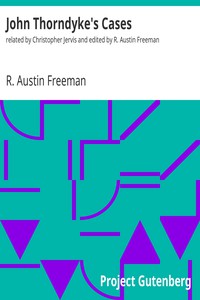The Mystery of 31 New Inn by R. Austin Freeman (adult books to read .TXT) 📗

- Author: R. Austin Freeman
Book online «The Mystery of 31 New Inn by R. Austin Freeman (adult books to read .TXT) 📗». Author R. Austin Freeman
"Did you have occasion to use it?" he asked.
"Yes. I paid another visit to the mysterious house and carried out your plan. I must tell you about it later."
"Do. I shall be keenly interested to hear all about your adventures. Is there plenty of candle left in the lamp?"
"Oh yes. I only used it for about an hour."
"Then let us be off," said Thorndyke; and we accordingly set forth on our quest; and, as we went, I reflected once more on the apparent vagueness of our proceedings. Presently I reopened the subject with Thorndyke.
"I can't imagine," said I, "that you have absolutely nothing in view. That you are going to this place with no defined purpose whatever."
"I did not say exactly that," replied Thorndyke. "I said that I was not going to look for any particular thing or fact. I am going in the hope that I may observe something that may start a new train of speculation. But that is not all. You know that an investigation follows a certain logical course. It begins with the observation of the conspicuous facts. We have done that. The facts were supplied by Marchmont. The next stage is to propose to oneself one or more provisional explanations or hypotheses. We have done that, too—or, at least I have, and I suppose you have."
"I haven't," said I. "There is Jeffrey's will, but why he should have made the change I cannot form the foggiest idea. But I should like to hear your provisional theories on the subject."
"You won't hear them at present. They are mere wild conjectures. But to resume: what do we do next?"
"Go to New Inn and rake over the deceased gentleman's apartments."
Thorndyke smilingly ignored my answer and continued—
"We examine each explanation in turn and see what follows from it; whether it agrees with all the facts and leads to the discovery of new ones, or, on the other hand, disagrees with some facts or leads us to an absurdity. Let us take a simple example.
"Suppose we find scattered over a field a number of largish masses of stone, which are entirely different in character from the rocks found in the neighbourhood. The question arises, how did those stones get into that field? Three explanations are proposed. One: that they are the products of former volcanic action; two: that they were brought from a distance by human agency; three: that they were carried thither from some distant country by icebergs. Now each of those explanations involves certain consequences. If the stones are volcanic, then they were once in a state of fusion. But we find that they are unaltered limestone and contain fossils. Then they are not volcanic. If they were borne by icebergs, then they were once part of a glacier and some of them will probably show the flat surfaces with parallel scratches which are found on glacier-borne stones. We examine them and find the characteristic scratched surfaces. Then they have probably been brought to this place by icebergs. But this does not exclude human agency, for they might have been brought by men to this place from some other where the icebergs had deposited them. A further comparison with other facts would be needed.
"So we proceed in cases like this present one. Of the facts that are known to us we invent certain explanations. From each of those explanations we deduce consequences; and if those consequences agree with new facts, they confirm the explanation, whereas if they disagree they tend to disprove it. But here we are at our destination."
We turned out of Wych Street into the arched passage leading into New Inn, and, halting at the half-door of the lodge, perceived a stout, purple-faced man crouching over the fire, coughing violently. He held up his hand to intimate that he was fully occupied for the moment, and we accordingly waited for his paroxysm to subside. At length he turned towards us, wiping his eyes, and inquired our business.
"Mr. Stephen Blackmore," said Thorndyke, "has given me permission to look over his chambers. He said that he would mention the matter to you."
"So he has, sir," said the porter; "but he has just taken the key himself to go to the chambers. If you walk across the Inn you'll find him there; it's on the farther side; number thirty-one, second floor."
We made our way across to the house indicated, the ground floor of which was occupied by a solicitor's offices and was distinguished by a good-sized brass plate. Although it had now been dark some time there was no light on the lower stairs, but we encountered on the first-floor landing a man who had just lit the lamp there. Thorndyke halted to address him.
"Can you tell me who occupies the chambers on the third floor?"
"The third floor has been empty about three months," was the reply.
"We are going up to look at the chambers on the second floor," said Thorndyke. "Are they pretty quiet?"
"Quiet!" exclaimed the man. "Lord bless you the place is like a cemetery for the deaf and dumb. There's the solicitors on the ground floor and the architects on the first floor. They both clear out about six, and when they're gone the house is as empty as a blown hegg. I don't wonder poor Mr. Blackmore made away with his-self. Livin' up there all alone, it must have been like Robinson Crusoe without no man Friday and not even a blooming goat to talk to. Quiet! It's quiet enough, if that's what you want. Wouldn't be no good to me."
With a contemptuous shake of the head, he turned and retired down the next flight, and, as the echoes of his footsteps died away we resumed our ascent.
"So it would appear," Thorndyke commented, "that when Jeffrey Blackmore came home that last evening, the house was empty."
Arrived on the second-floor landing, we were confronted by a solid-looking door on the lintel of which the deceased man's name was painted in white lettering which still looked new and fresh. Thorndyke knocked at the door, which was at once opened by Stephen Blackmore.
"I haven't wasted any time before taking advantage of your permission, you see," my colleague said as we entered.
"No, indeed," said Stephen; "you are very prompt. I have been rather wondering what kind of information you expect to gather from an inspection of these rooms."
Thorndyke smiled genially, amused, no doubt, by the similarity of Stephen's remarks to those of mine which he had so recently criticized.
"A man of science, Mr. Blackmore," he said, "expects nothing. He collects facts and keeps an open mind. As to me, I am a mere legal Autolycus, a snapper-up of unconsidered trifles of evidence. When I have accumulated a few facts, I arrange them, compare them and think about them. Sometimes the comparison yields new matter and sometimes it doesn't; but in any case, believe me, it is a capital error to decide beforehand what data are to be sought for."
"Yes, I suppose that is so," said Stephen; "though, to me, it almost looks as if Mr. Marchmont was right; that there is nothing to investigate."
"You should have thought of that before you consulted me," laughed Thorndyke. "As it is, I am engaged to look into the case and I shall do so; and, as I have said, I shall keep an open mind until I have all the facts in my possession."
He glanced round the sitting-room, which we had now entered, and continued:
"These are fine, dignified old rooms. It seems a sin to have covered up all this oak panelling and that carved cornice and mantel with paint. Think what it must have been like when the beautiful figured wood was exposed."
"It would be very dark," Stephen observed.
"Yes," Thorndyke agreed, "and I suppose we care more for light and less for beauty than our ancestors did. But now, tell me; looking round these rooms, do they convey to you a similar impression to that which the old rooms did? Have they the same general character?"
"Not quite, I think. Of course the rooms in Jermyn Street were in a different kind of house, but beyond that, I seem to feel a certain difference; which is rather odd, seeing that the furniture is the same. But the old rooms were more cosy, more homelike. I find something rather bare and cheerless, I was almost going to say squalid, in the look of these chambers."
"That is rather what I should have expected," said Thorndyke. "The opium habit alters a man's character profoundly; and, somehow, apart from the mere furnishing, a room reflects in some subtle way, but very distinctly, the personality of its occupant, especially when that occupant lives a solitary life. Do you see any evidences of the activities that used to occupy your uncle?"
"Not very much," replied Stephen. "But the place may not be quite as he left it. I found one or two of his books on the table and put them back in the shelves, but I found no manuscript or notes such as he used to make. I noticed, too, that his ink-slab which he used to keep so scrupulously clean is covered with dry smears and that the stick of ink is all cracked at the end, as if he had not used it for months. It seems to point to a great change in his habits."
"What used he to do with Chinese ink?" Thorndyke asked.
"He corresponded with some of his native friends in Japan, and he used to write in the Japanese character even if they understood English. That was what he chiefly used the Chinese ink for. But he also used to copy the inscriptions from these things." Here Stephen lifted from the mantelpiece what looked like a fossil Bath bun, but was actually a clay tablet covered with minute indented writing.
"Your uncle could read the cuneiform character, then?"
"Yes; he was something of an expert. These tablets are, I believe, leases and other legal documents from Eridu and other Babylonian cities. He used to copy the inscriptions in the cuneiform writing and then translate them into English. But I mustn't stay here any longer as I have an engagement for this evening. I just dropped in to get these two volumes—Thornton's History of Babylonia, which he once advised me to read. Shall I give you the key? You'd better have it and leave it with the porter as you go out."
He shook hands with us and we walked out with him to the landing and stood watching him as he ran down the stairs. Glancing at Thorndyke by the light of the gas lamp on the landing, I thought I detected in his impassive face that almost imperceptible change of expression to which I have already alluded as indicating pleasure or satisfaction.
"You are looking quite pleased with yourself," I remarked.
"I am not displeased," he replied calmly. "Autolycus has picked up a few crumbs; very small ones, but still crumbs. No doubt his learned junior has picked up a few likewise?"
I shook my head—and inwardly suspected it of being rather a thick head.
"I did not perceive anything in the least degree significant in what Stephen was telling you," said I. "It was all very interesting, but it did not seem to have any bearing on his uncle's will."
"I was not referring only to what Stephen has told us, although that was, as you say, very interesting. While he was talking I was looking about the room, and I have seen a very strange thing. Let me show it to you."
He linked his arm in mine and, walking me back into the room, halted opposite the fire-place.
"There," said he, "look at that. It is a most remarkable object."
The Inverted Inscription.
I followed the direction of his gaze and saw an oblong frame enclosing a large photograph of an inscription in the weird and cabalistic arrow-head character. I looked at it in silence for some seconds and then, somewhat disappointed, remarked:
"I don't see anything very remarkable in it, under the circumstances. In any ordinary room it would be, I admit; but Stephen has just told us that his uncle was something of an expert in cuneiform writing."
"Exactly," said Thorndyke. "That is my point. That is what makes it so remarkable."
"I don't follow you at all," said I. "That a man should hang upon his wall an inscription that is legible to him does not seem to me at all out of the way. It would be much more singular if he should hang up an inscription that he could not read."
"No doubt," replied Thorndyke. "But you will agree with me that it would be still more singular if a man should hang upon his wall an inscription that he could read—and hang it





Comments (0)